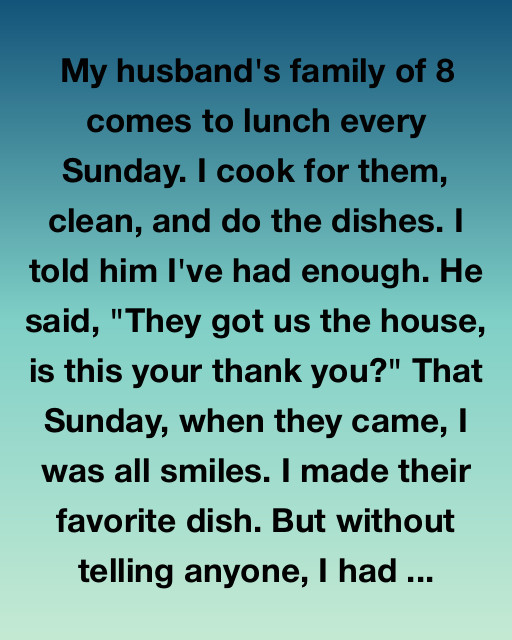Every Sunday at noon, eight of them spilled through our door like clockwork—his parents, siblings, nieces—hungry and loud. I’d chop, sauté, serve, smile, scrape plates, and stand at the sink while laughter drifted from the living room. When I finally told my husband I was done, he said, “They got us the house. Is this your thank you?”
That next Sunday, I greeted everyone with a bright smile and their favorite stew. One heavy pot. No apron. No backup tray in the oven. When his mother asked why I wasn’t eating, I said sweetly, “Oh, this is all for you. After all these years, you deserve the full portion.” They laughed—until the food ran out and I hadn’t had a bite. My husband looked embarrassed. “You didn’t eat?” I shrugged. “You all come first, right?”
After they left, he hissed that I’d made it awkward. I told him I’d been invisible for three years. No one asked how I was. No one brought dessert. No one lifted a finger. I wasn’t a servant; I was their host—alone.
The next Sunday, I didn’t cook. I watched a movie in bed while the doorbell rang. I greeted them, pointed toward the kitchen, and said, “Bread and butter’s on the counter—help yourselves.” His sister half-joked, “Are you on strike?” I smiled. “Let’s call it a new tradition.” They ate lightly, stayed briefly, and left quietly. My husband said almost nothing.
A few days later, his older sister called. “We’ve been rude,” she said. “I’m sorry.” The apology stunned me. “Bring dessert if you want,” I said. “I don’t need serving. I just want to be seen.”
Things shifted. She arrived with a cake; his mom brought salad; his brother rolled up his sleeves at the sink. I didn’t even need to ask. My husband, though, stayed distant, like I’d rearranged the furniture in his head and he hadn’t found the light switch yet.
One night I asked, “Are you mad?” He stared at the floor. “You changed things. It feels weird.” I nodded. “I had to. I was drowning, and you didn’t notice.” He swallowed. “I didn’t know it was that bad.” “That’s the problem,” I said. “You never asked.”
Then his mother invited me for coffee. I braced for a scolding—but she took my hand and said, “When I was your age, I did the same thing. Every Sunday. Every holiday. No one thanked me either.” Her eyes softened. “I saw myself in you. I should’ve spoken up.” She held on a beat longer. “Thank you for reminding me that respect starts with how we let others treat us.”
That Sunday, she brought the main dish. His sister handled sides. I made lemonade and sat down like a guest. My husband sat beside me, not across, and poured drinks. After everyone left, he did the dishes. All of them. “I get it now,” he said quietly. “I took you for granted.” I didn’t give a speech. I just hugged him.
A few months later, the whole family rented a lake house for a reunion. When his mom asked who’d cook one night, he answered before I could. “We’ll bring drinks and dessert. Someone else can handle dinner.” I looked at him. He winked.
That evening, he pulled me aside on the dock. “I talked to my dad,” he said. “About the house.” The water went still in my chest. “What about it?” “They covered the down payment, but the deed is still in their name. It wasn’t a gift—it was… leverage. In case we ever split.” I sat back on the weathered plank. Of course. It explained their entitlement, the tally marks no one mentioned but everyone felt.
“We need to buy it out,” he said. “Make it ours.” So we did. We cut back, saved, refinanced. A year later, we signed the papers with shaky hands. The first Sunday after, we ate alone on the porch: a simple pasta, a bowl of greens, the kind of quiet you can hear. “Feels different,” he said. “It’s home now,” I answered. “Ours. Not a debt.” He reached across the table. “Thank you for not giving up.” I squeezed his fingers. “Thank you for showing up.”
Later, his sister knocked early on a Sunday. She stood in the doorway with red eyes and a small suitcase. “I left my boyfriend,” she said. “Watching you… I realized I was settling. I thought love meant doing everything for someone who doesn’t see you.” I pulled her into the kitchen and we made pancakes—together, laughing while batter splattered the stove. The house felt full in a new way.
Here’s what I learned: sometimes the loudest rebellion is kindness to yourself. Sometimes you don’t need a fight—you need a boundary. When you change the rules of how you’re treated, the right people adjust. The wrong ones fade. And the ones who matter most learn to pull up a chair, bring a dish, and ask you how you are before they pass their plate.
You don’t owe your peace to people who measure your worth by what you serve. Love without respect isn’t love; it’s control dressed up as tradition. If you feel like you’re always the one giving, set the table for yourself. Watch who brings a fork.


